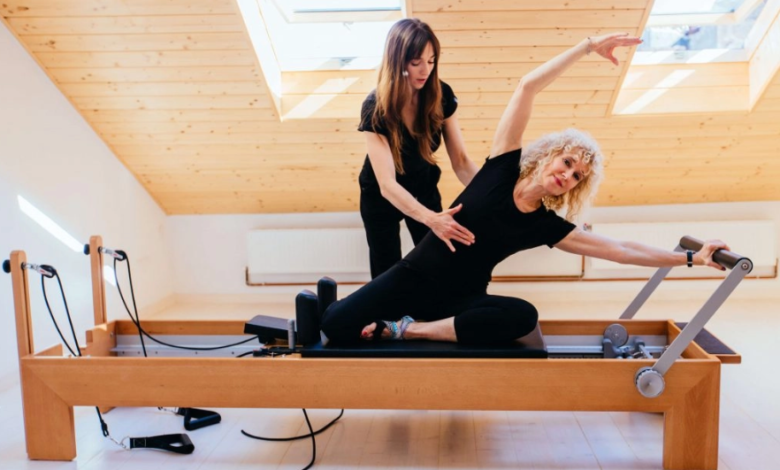Exploring the Benefits of Pilates Reformer Equipment

Pilates has emerged as one of the most popular fitness methods worldwide, thanks to its ability to improve strength, posture, and flexibility while being gentle on the joints. At the heart of many Pilates workouts lies the pilates reformer equipment—a dynamic, versatile machine that enables users to perform hundreds of exercises with varying resistance and intensity. Whether you are a fitness enthusiast, studio owner, or new to Pilates altogether, understanding the role and benefits of this equipment is essential to making the most of your wellness journey.
What Is Pilates Reformer Equipment?
The pilates reformer equipment is a specialized machine designed by Joseph Pilates, the creator of the Pilates method. It consists of a flat, cushioned carriage that glides along rails within a rectangular frame. The carriage is attached to springs that provide adjustable resistance. Users perform exercises lying, sitting, kneeling, or standing on the carriage, using ropes, straps, and a footbar to push or pull against the resistance.
Reformers are widely used in Pilates studios, rehabilitation clinics, and gyms due to their ability to offer low-impact, full-body workouts suitable for all fitness levels.
Key Components of Pilates Reformer Equipment
Understanding the anatomy of the reformer can help users appreciate its versatility. The main components include:
- Carriage: The moving platform that slides back and forth.
- Springs: Provide variable resistance and are color-coded based on tension.
- Footbar: Used to press against with the hands or feet.
- Shoulder Blocks: Help keep the user in proper alignment during movement.
- Ropes and Straps: Used for arm and leg exercises.
- Headrest: Provides comfort and neck support.
- Gear System: Adjusts the starting tension and range of motion.
Each component plays a crucial role in delivering a smooth, customizable workout experience.
Benefits of Using Pilates Reformer Equipment
The appeal of pilates reformer equipment lies in its ability to provide diverse, effective workouts. Here are some standout benefits:
1. Improved Core Strength
Nearly every reformer exercise requires core engagement, making it one of the best machines for building abdominal strength and stability.
2. Enhanced Flexibility
The flowing, controlled movements stretch and lengthen muscles. Over time, users experience improved flexibility, reduced muscle stiffness, and increased range of motion.
3. Low-Impact Exercise
Unlike running or high-intensity interval training, reformer Pilates is gentle on the joints. It’s ideal for people recovering from injury or those with arthritis and joint issues.
4. Posture and Alignment
The equipment encourages precise movement and body awareness. This focus helps correct muscular imbalances and supports better posture in daily life.
5. Full-Body Conditioning
From arms and legs to glutes and back, reformer exercises target multiple muscle groups in a single session, offering a complete workout without high stress on the body.
6. Adaptable for All Levels
Whether you’re a beginner or an advanced athlete, the pilates reformer equipment can be adjusted to match your ability. Changing the spring tension and position allows endless variations.
See also: Understanding the Funeral Process: Honoring Life With Care and Dignity
Reformer Pilates vs. Mat Pilates
Both mat Pilates and reformer Pilates share foundational principles—core engagement, breathing, alignment—but the use of pilates reformer equipment adds resistance and support, making it more dynamic and challenging.
Here’s how they differ:
| Feature | Mat Pilates | Reformer Pilates |
|---|---|---|
| Equipment | None or minimal props | Full reformer machine |
| Resistance | Bodyweight only | Springs and straps offer resistance |
| Exercise Variety | Limited to mat-based | Hundreds of exercises possible |
| Support for Injuries | Less adjustable | Highly adjustable and supportive |
| Intensity | Moderate | Can be low to high |
In summary, reformer Pilates offers more exercise options and a greater range of difficulty and support, making it especially suitable for studios and rehabilitation settings.
Choosing the Right Pilates Reformer Equipment
If you’re thinking of buying pilates reformer equipment, whether for personal or professional use, several factors should guide your decision:
✅ Build Quality
Look for a frame made of durable materials like aluminum or hardwood. High-end reformers offer better longevity and smoother performance.
✅ Spring System
Choose a model with at least five springs for adjustable resistance levels. Color-coded springs make it easier to change settings during workouts.
✅ Comfort and Adjustability
Ensure the carriage is well-padded, the straps are comfortable, and components like the footbar, headrest, and shoulder blocks are adjustable.
✅ Size and Space
Reformers come in various lengths and heights. Make sure the model fits your available space and allows full movement for all users.
✅ Accessories
Some models include jump boards, towers, or sitting boxes for expanded workouts. These can add value and versatility to your practice.
Reformer Pilates in Rehab and Therapy
Physical therapists and rehab specialists increasingly use pilates reformer equipment to assist clients recovering from injury or surgery. The ability to control resistance, range of motion, and body positioning makes it an excellent tool for gentle reconditioning.
Common rehab applications include:
- Post-surgery mobility training
- Back pain relief
- Hip, knee, and shoulder rehabilitation
- Balance training for seniors
The reformer’s supportive nature helps clients regain strength, mobility, and confidence in a safe environment.
Maintenance and Safety Tips
To ensure a safe and effective workout environment, it’s important to maintain your pilates reformer equipment regularly:
- Wipe down the carriage and straps after each use.
- Check springs and cords monthly for signs of wear.
- Lubricate wheels and guide rails as needed.
- Replace springs annually or as recommended by the manufacturer.
- Keep the floor around the reformer clear to avoid accidents.
Always follow manufacturer guidelines, and make sure new users are trained on proper technique to avoid injury.
Final Thoughts
The Pilates Reformer Equipment is more than just a piece of fitness gear — it’s a tool that supports movement, recovery, and strength. Its versatility, effectiveness, and adaptability make it a staple in both commercial studios and home settings. Whether your goal is improved core strength, better posture, injury recovery, or overall fitness, the reformer offers a safe and efficient path to get there.
For studio owners, investing in quality reformers not only enhances the workout experience but also elevates your brand. For individuals, it’s a long-term investment in physical health and well-being.





